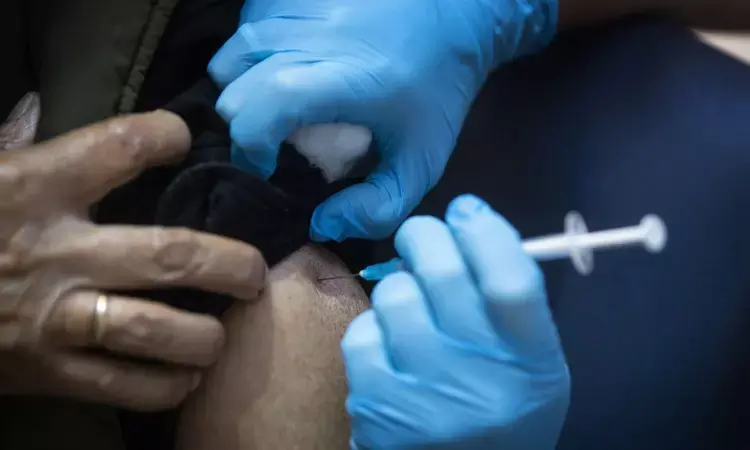- Home
- Medical news & Guidelines
- Anesthesiology
- Cardiology and CTVS
- Critical Care
- Dentistry
- Dermatology
- Diabetes and Endocrinology
- ENT
- Gastroenterology
- Medicine
- Nephrology
- Neurology
- Obstretics-Gynaecology
- Oncology
- Ophthalmology
- Orthopaedics
- Pediatrics-Neonatology
- Psychiatry
- Pulmonology
- Radiology
- Surgery
- Urology
- Laboratory Medicine
- Diet
- Nursing
- Paramedical
- Physiotherapy
- Health news
- Fact Check
- Bone Health Fact Check
- Brain Health Fact Check
- Cancer Related Fact Check
- Child Care Fact Check
- Dental and oral health fact check
- Diabetes and metabolic health fact check
- Diet and Nutrition Fact Check
- Eye and ENT Care Fact Check
- Fitness fact check
- Gut health fact check
- Heart health fact check
- Kidney health fact check
- Medical education fact check
- Men's health fact check
- Respiratory fact check
- Skin and hair care fact check
- Vaccine and Immunization fact check
- Women's health fact check
- AYUSH
- State News
- Andaman and Nicobar Islands
- Andhra Pradesh
- Arunachal Pradesh
- Assam
- Bihar
- Chandigarh
- Chattisgarh
- Dadra and Nagar Haveli
- Daman and Diu
- Delhi
- Goa
- Gujarat
- Haryana
- Himachal Pradesh
- Jammu & Kashmir
- Jharkhand
- Karnataka
- Kerala
- Ladakh
- Lakshadweep
- Madhya Pradesh
- Maharashtra
- Manipur
- Meghalaya
- Mizoram
- Nagaland
- Odisha
- Puducherry
- Punjab
- Rajasthan
- Sikkim
- Tamil Nadu
- Telangana
- Tripura
- Uttar Pradesh
- Uttrakhand
- West Bengal
- Medical Education
- Industry
Patients with Adrenal Insufficiency may have higher Risk of Severe COVID-19

Patients with adrenal insufficiency (AI) face a significantly increased risk of severe outcomes from COVID-19, according to a recent Swedish national register-based cohort study. While they have a similar risk of contracting the virus as the general population, the study published in Journal of Internal Medicine revealed more than twofold increased risk of severe infection and a fatal outcome for AI patients.
The study, conducted from January 2020 to February 2021, compared 5,430 patients with AI to a control group of 54,300 individuals from the general population, matching them by age and sex at a ratio of 10:1. The findings are eye-opening and could have substantial implications for the management and prioritization of healthcare for this group of patients.
The key results of the study were:
AI patients and the control group had similar rates of COVID-19 infection, indicating that AI itself does not increase the likelihood of contracting the virus.
However, when it came to severe outcomes, the disparities became stark. AI patients faced a substantially increased risk of hospitalization (2.1% vs. 0.8%), intensive care admission (0.3% vs. 0.1%), and death (0.8% vs. 0.2%) due to COVID-19 compared to the control group.
After adjusting for socioeconomic factors and comorbidities, the study reported increased hazard ratios (HR) for AI patients for hospitalization (1.96), intensive care admission (2.76), and death (2.29). These elevated risks highlight the vulnerability of AI patients to severe COVID-19 outcomes.
The findings underscore the importance of prioritizing AI patients for vaccination, antiviral therapy, and other appropriate treatments to reduce the risk of hospitalization and death due to COVID-19. While they are not more likely to contract the virus, AI patients are at a distinct disadvantage when it comes to the potential consequences of a COVID-19 infection.
Reference:
Bergthorsdottir, R., Esposito, D., Olsson, D. S., Ragnarsson, O., Dahlqvist, P., Bensing, S., Nåtman, J., Johannsson, G., & Nyberg, F. (2023). Increased risk of hospitalization, intensive care and death due to COVID‐19 in patients with adrenal insufficiency: A Swedish nationwide study. In Journal of Internal Medicine. Wiley. https://doi.org/10.1111/joim.13731
Neuroscience Masters graduate
Jacinthlyn Sylvia, a Neuroscience Master's graduate from Chennai has worked extensively in deciphering the neurobiology of cognition and motor control in aging. She also has spread-out exposure to Neurosurgery from her Bachelor’s. She is currently involved in active Neuro-Oncology research. She is an upcoming neuroscientist with a fiery passion for writing. Her news cover at Medical Dialogues feature recent discoveries and updates from the healthcare and biomedical research fields. She can be reached at editorial@medicaldialogues.in
Dr Kamal Kant Kohli-MBBS, DTCD- a chest specialist with more than 30 years of practice and a flair for writing clinical articles, Dr Kamal Kant Kohli joined Medical Dialogues as a Chief Editor of Medical News. Besides writing articles, as an editor, he proofreads and verifies all the medical content published on Medical Dialogues including those coming from journals, studies,medical conferences,guidelines etc. Email: drkohli@medicaldialogues.in. Contact no. 011-43720751


